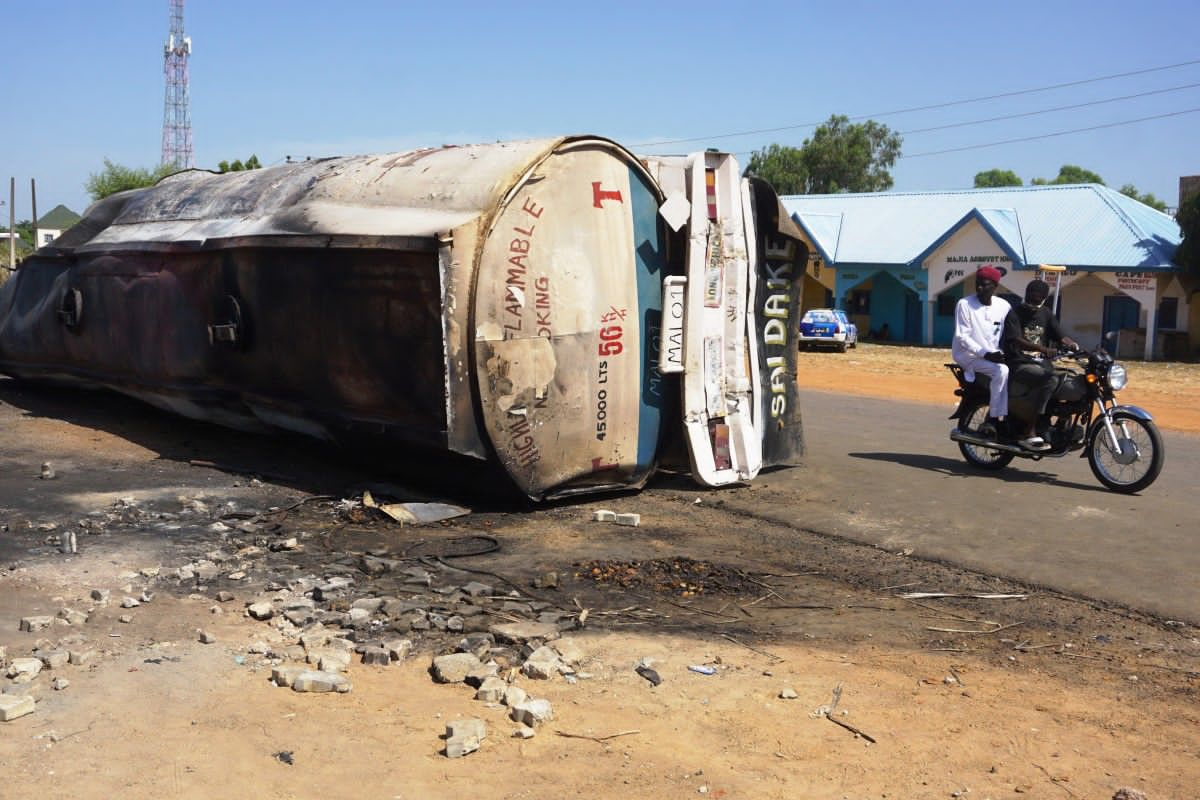
On July 2012 in Ahoada in Rivers State, about 100 people were burnt to death whilst scooping up petrol from an overturned tanker. Another one happened two months later at Igwuruta, Rivers State. One was recorded again at Mbiama in the same Rivers State in 2013. Tragedies struck in 2022 in Ogun State and Lagos-Ibadan Expressway, Shagamu; April 2023 in Plateau State; July 2023 in Ondo State and December 2023 in Ebonyi State.
It’s the same story in the following regions since the removal of petroleum subsidy in 2023: Obirikwerre Bridge (which was an aviation fuel explosion), (Rivers State), Ibadan (Oyo State), Agaie (Niger State), Majiya (Jigawa State), Agbor (Delta State), Jalingo (Taraba State),Suleja (Niger State), Ibafo (Ogun State), Udi (Enugu State) and others. In fact, the Federal Road Safety Corps (FRSC) hasclaimed that over 600 deaths have been recorded.
If the FRSC’s claim is true, sensitisation and campaigns against petrol scooping, and crackdowns on reckless drivers and rickety tankers should be dramatic.
First, sensitisation should begin from rural areas, especially schools (nursery to tertiary), where the ‘risks of tanker explosion and scooping of petrol’ will be a topic. People should be trained on the safest steps to take when a tanker spills its contents.
In addition, it should be impressed upon people the need to flee or vacate homes and contact firefighters immediately such kind of accident happens in residential areas. Ideally, educators are to familiarise people (especially teenagers and children) with such concepts as combustion, flammability and volatility, and let the children know that they’re future leaders of Nigeria whose lives mustn’t be cut short by tanker explosions.
Second, people should know that Nigerian roads pose challenges to transportation although the ongoing road rehabilitation under the administration of President Tinubu has been welcomed. A strong awareness that many tankerdrivers, who find themselves behind the wheel, are underage and unqualified to be on the road.
Part of the sensitisation is knowing that tankers operate mostly at night in Nigeria and there are no special roads designed for them, thereby endangering lives and properties. Apart from human error, such as sleeping whilst driving, being under the influence, overtaking plus I-won’t-allow-you-to-overtake-me madness, over speeding and transferred aggression, tanker accidents have also been linked to bad roads.
Undoubtedly, corruption is at the heart of issues relating to bad roads in Nigeria. Many federal roads, particularly the notorious East-West road, are death traps yearning for a touch of repair. Paved with good intentions is the road to hell. So, government and relevant authorities should be transparent and channel to the right source funds meant for road infrastructure rather than divert them.
Third, an awareness that overpopulation causes oil tanker accidents should be created. There are about 300 million people in Nigeria today (ignore the political figure of 210 million you read in the papers and hear of out there), a lot of who own more than one vehicle. Too many vehicles compete for space on narrow and worn-out roads. Wear and tear and the ‘law of diminishing returns’ set in, hindering the motorability of such roads.
The result is a frustrating tailback. Stuck in this long traffic jam are impatient, dare-devil drivers driving dangerously to arrive at their destinations on target time. Due to over speeding caused by frustration and disorderly haste, the drivers lose control of their tankers, crash them and spill their contents.
Last, oil-laden vehicles that aren’t roadworthy are often allowed to operate on the roads by their greedy owners, in violation of the FRSC’s rules and regulations. This is suicidal and unacceptable. Worse still, some drivers operate tankers that have expired tyres, malfunctioning valves, weak shafts, dead headlights (which are sometimes substituted with a rechargeable lamp or phone torch), etc., whilst others don’t have good brakes.
When a tanke rcarrying a volatile substance keels over and spills its contents, commonsense demands that no one should go near it because the risk impact is usually profound when the vehicle explodes. Poverty, hunger, hardship and the desire to steal have sown disobedience and stubbornness in the hearts of many Nigerians of today.
For instance, despite the resistance put up by the police officers in Majiya who said: ‘We tried our best to stop people going to the vehicle to get petrol… despite barricading the area, we’re overpowered and as people were scooping fuel, fire erupted’, the woolly-headed locals disobeyed the officers.
The decision to scoop up fuel at a crash site is sheer stupidity and senselessness. Petrol scoopers are nothing but terrorists set to take their own lives.
With the level of destruction which fires have caused so far in the country, it’s high time people became wise and practised safety measures aimed at averting further occurrences.
Thus, sensitisation and crusades require the concerted efforts of NGOs, NEMA, FRSC, NOA, NCDC, radio/TV stations, social media, the press, the police, LGA chairpersons, parents, teachers, town criers, religious leaders, monarchs, etc., who will reach everywhere–markets, churches, schools, villages, mosques, event centres, IDP camps, companies, on the vehicles, on the planes, on the seas, etc.–with their megaphones.
But will the trend stop after all this sensitisation?
Sola wrote from Port Harcourt.






